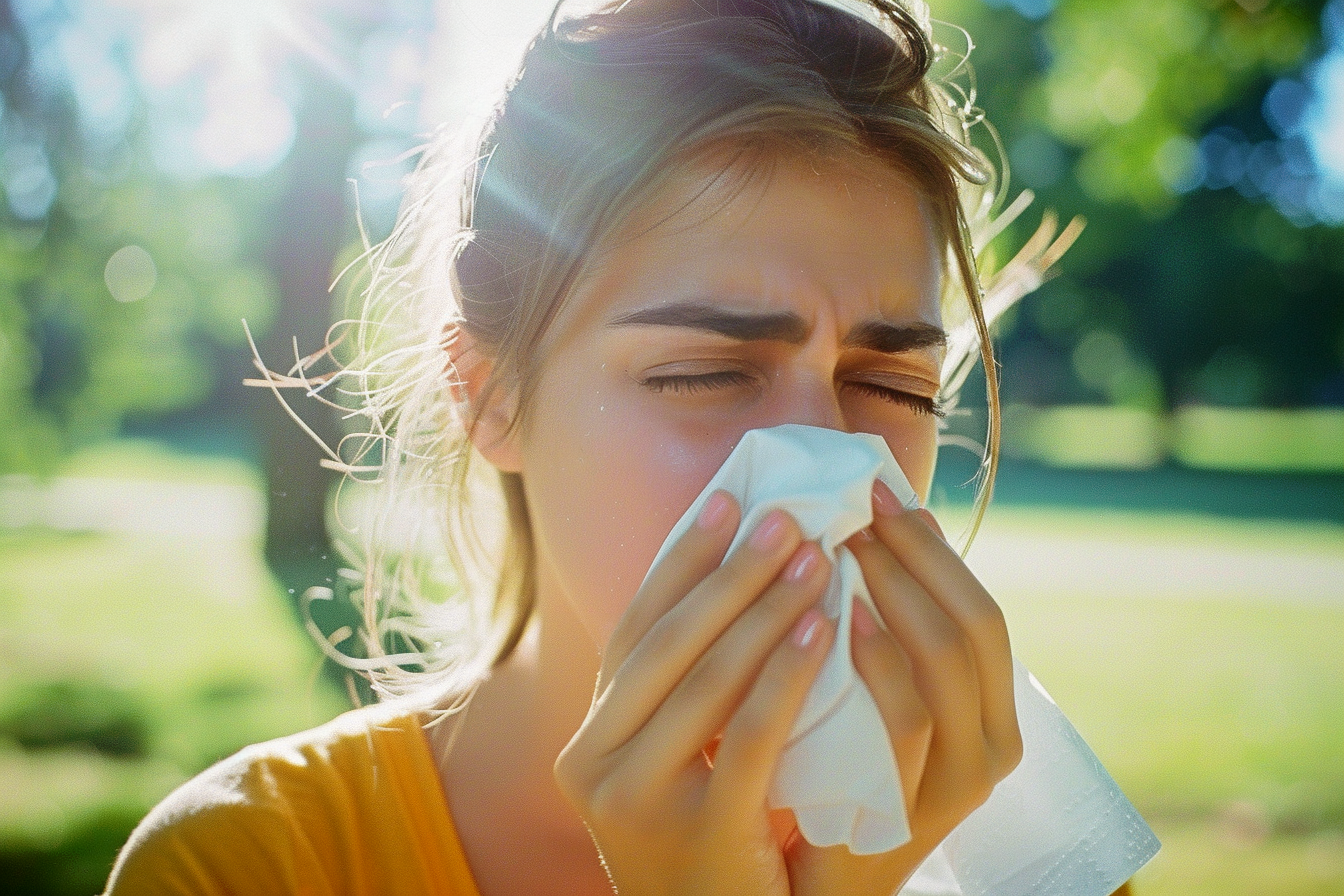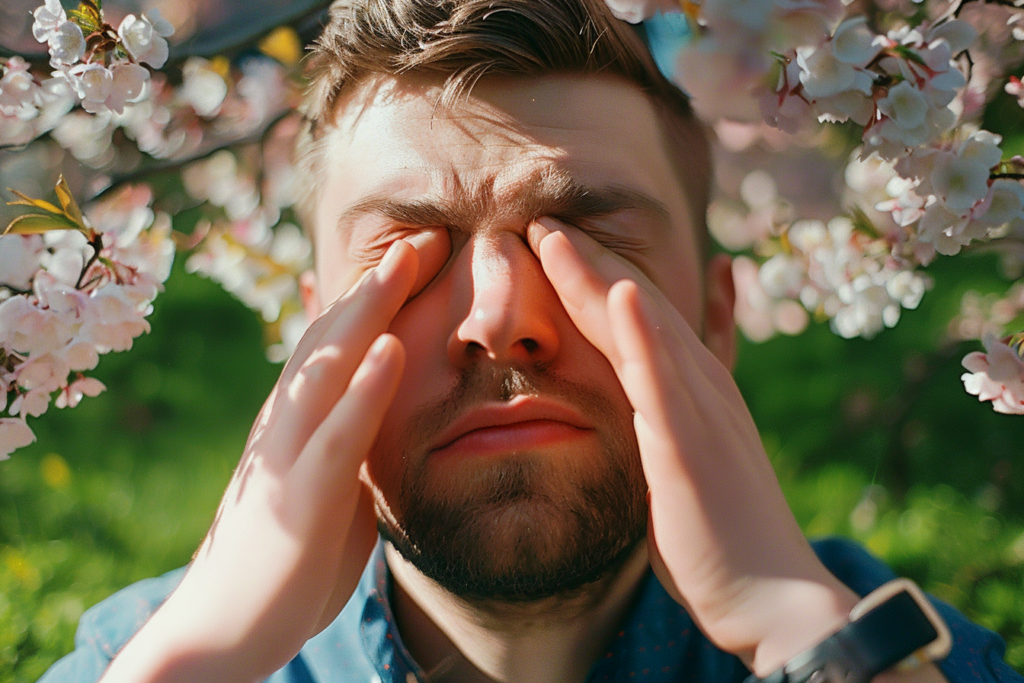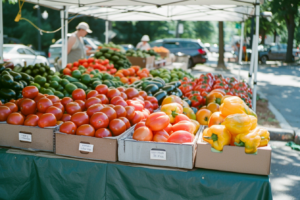
Steps to take if it feels like the Dallas pollen count is killing you
Hold on to your tissues; it’s allergy season in DFW.
Rachel Edenson Pinn
March 21, 2024
You know you’re in DFW when those pesky seasonal allergies hit. From the annoying watery eyes to the never-ending runny nose and sneeze marathons, the allergy struggle is real. And the crazy weather in Dallas doesn’t help, either. So, if you’re caught in the eternal battle against seasonal sniffles, you’re not alone.
Recent studies have shown that approximately 30% of adults and 40% of children in the United States suffer from allergies, which you can largely blame on pollen, mold spores, and dust mites. Here in Dallas, we’re not just joining the allergy club; we’re basically at the top of the charts for pollen and mold issues. Between the warm climate and high levels of humidity, North Texas has the perfect environment for these types of allergens to thrive. Aren’t we lucky?
When is allergy season in Dallas?
The typical “allergy season” tends to peak in December, January, May, and September for Dallasites. Obviously, limiting time outdoors to avoid too much exposure to allergens like pollen, trees, weeds, and grasses is a good start, but what if that’s not practical, or enough to keep allergies at bay?
What can I do if I suffer from seasonal allergies in Dallas?
For those suffering from seasonal allergies in the Dallas area, there are several treatment options. Simple remedies include nasal rinses, over-the-counter antihistamines such as loratadine or cetirizine, nasal corticosteroid sprays like fluticasone or mometasone, and decongestants such as pseudoephedrine. For those with more severe allergies or those who do not respond well to other treatments, allergy shots or sublingual immunotherapy may be a good option*.
What else can I do?
According to the experts at Texas Allergy MD, there are some less medicinal – but very practical – things you can do during allergy season to limit your reaction to seasonal allergies in North Texas.
- On high pollen count days, limit exposure outdoors or try to schedule any outdoor activities for later in the day when pollen counts diminish.
- Change clothes and brush or wash your hair after being outside, as pollen and other allergens tend to cling to hair and clothes.
- Wear sunglasses to act as a physical barrier between your eyes and the allergy-causing particles in the air.
- Use a saline solution to rinse pollen from nasal passages and soothe dryness at the same time.
- Using natural barriers like a bit of Vaseline around your nostrils to trap particles before they get into your nose can help, too.
- Hats and layers can help make it harder for pollen to stick to your hair, and easier to remove from an outer layer of clothing once inside.
- Keeping windows closed and using air purifiers can help once you’re inside as well.

Not just pollen…
Even though pollen and its resulting hay fever are the most commonly complained-about allergy here, there are other specific types of seasonal allergens in the Dallas-Ft. Worth area, each with some corresponding strategies to remedy them.
Humidity = more mold
In Dallas, mold spores can be a common allergen, especially during humid and rainy months. To prevent exposure to mold spores, it is important to keep indoor humidity levels below 50%, fix any water leaks or damage promptly, and regularly clean and inspect areas prone to mold growth such as bathrooms and basements. Treatment options for mold allergies include antihistamines, decongestants, nasal steroid sprays, and allergy shots.
Dallas does dust
Dust mites thrive in warm and humid environments, making them particularly prevalent in Dallas. To reduce exposure to dust mites, regularly clean and vacuum your home, wash bedding in hot water weekly, and use allergen-proof pillows and mattress covers. As with other seasonal allergies, symptoms caused by dust mites can be managed similarly to mold or pollen symptoms.
No matter what allergies you’ve got this time of year, know that you’re not alone, and there are a whole range of strategies and tactics to help provide relief.
*Please note that while we strive to provide helpful recommendations and information, we are not medical professionals. It’s crucial to consult with your healthcare provider before making any significant changes to your health or lifestyle.
For more expert tips and insider information, subscribe to the Localite newsletter.
Share this article
Nearby Cortland Locations

Set your sights on these Arizona stargazing spots
Where starry night skies and twinkly constellations shine: a guide to the best stargazing in Arizona.
What do you get when you combine clear skies, community stewardship, and otherworldly geographical wonders? The answer: some of the best stargazing in the US. With views of Jupiter, Mars, Mercury, and the Andromeda galaxy on clear nights, Arizona is a top spot for staring into space. But don’t just take our word for it — you have to see it for yourself.
Local Stargazing
Fountain Hills
Despite its location on the edge of one of the nation’s largest metropolitan areas, Fountain Hills has some surprisingly dark nights, creating the perfect condition for stargazing. The nearby McDowell Mountains have a sort of screening effect that keeps the metro area light out. The result is a dark night sky that’s filled with stars and, when the light is low enough, incredible views of the Milky Way. In 2018, Fountain Hills was officially recognized as a Dark Sky Community, adding to the growing list of designated International Dark Sky Places (IDSP) in Arizona.
ADERO Scottsdale
It’s not every day, or night, that you find a resort that’s a certified Dark Sky Zone. ADERO Scottsdale just so happens to be one. And lucky for you, it’s right in your backyard. Because of the limited light pollution in the region and local nighttime artificial light ordinances, the Scottsdale luxury resort is considered a stargazing oasis. Adding to its shining reputation as a stargazing hotspot, ADERO also has several high-definition telescopes for resort guests to use as well as programming like Friday night sky tours hosted by the Star Dudes.
McDowell Mountain Regional Park
McDowell Mountain Regional Park is a recreation destination located at the intersection of Fountain Hills and North Scottsdale. The park’s prime position in the McDowell Mountains makes it one of the best places to go stargazing in the Valley. The park trails are open late for hikers, mountain bikers, and astronomy fans hoping to catch a glimpse of twinkly constellations in the night sky. And, the park regularly hosts guided stargazing nights where visitors can peer through telescopes and see galaxies, nebulae, star clusters, and desert plants.
Northern Arizona Stargazing
Under Canvas Lake Powell – Grand Staircase
For the ultimate stargazing adventure, point your GPS north to Under Canvas Lake Powell – Grand Staircase. A 14-mile trip from Arizona’s main marina at Lake Powell, this glamping getaway has everything you need for a magical night under a blanket of stars including upscale amenities, safari-inspired tent accommodations, and stargazing programming. In 2023, Under Canvas Lake Powell – Grand Staircase became the first Dark Sky Approved Lodging location, complementing the Dark Sky Places conservation program.
Lowell Observatory
So many Pluto-related discoveries were made at Flagstaff’s Lowell Observatory, the city is casually referred to as the home of Pluto. Flagstaff even has its own Pluto festival. Pluto aside, if you’re eager to see stars, you’re in the right place. The Lowell Observatory is home to one of the best collections of telescopes available to the public, including six advanced telescopes that can reveal rich star fields and colorful planets. A true astronomer’s paradise, the observatory offers tours, science talks, and demos that cover topics like the colors of the cosmos, stargazing nights from the observation deck, and even solar viewings.
Southern Arizona Stargazing
Saguaro National Park
Saguaro National Park may be known for its expansive stretches of scenic Saguaro-flecked terrain but the Southern Arizona National Park is gaining popularity for another reason — its dark, unobstructed starry skies. After years of reducing human-made light, Saguaro National Park was named a Dark Sky Urban Night Sky Place in 2023. The park offers educational and stargazing programs and there’s more to discover in nearby Tucson where you can explore world-class observatories like the Mount Lemmon SkyCenter or the Kitt Peak National Observatory.
Tumacácori National Historical Park
Home to the ruins of three Spanish mission communities, Tumácacori is a historic site and designated International Dark Sky Park with brilliant night skies that’s popular with both history buffs and astronomy fans. Here, you can experience what the desert southwest was like hundreds of years ago among the ruins while gazing up at the unobstructed night sky. On select nights, the park hosts guided moonlight hikes that wind around the park trails as well as other after-dark experiences like starry night photography programs.
Want more Phoenix experiences and events? Subscribe to the Localite newsletter.
Share this article
Nearby Cortland Locations

Visit these 8 Atlanta area farmers markets this spring
Fill your basket with local goodness at our favorite Atlanta markets.
Kickstart your spring with a visit to one of Atlanta’s many farmers markets, where you can find a variety of fresh and healthy produce, homemade baked goods, sauces, preserves, crafts, and more. Whether you’re a foodie or just love a leisurely stroll, these spots are buzzing with all the good stuff. Luckily, several of Atlanta’s best farmers markets are accessible year-round and each one offers a unique opportunity to connect with local purveyors. Here are some of our favorites.
Freedom Farmers Market
When: Saturdays, 8:30am-12pm, year-round
Where: 453 John Lewis Freedom Parkway NE at the Carter Center Library
The Freedom Farmers Market at the Carter Center is a must-visit if you’re looking for fresh and locally sourced produce. You’ll get to explore the season’s latest harvest with a wide variety of prepared foods and pop-up meals cooked by local chefs. Don’t forget to check out the seasonal flowers and garden seedlings in the spring. Bring a cart so you can stock up on all your favorites. This market is a great family-friendly and pet-friendly environment, making it the perfect place to spend your morning, followed by a relaxing picnic at Freedom Park down the street.
East Atlanta Village Farmers Market
When: Thursdays, 4pm-8pm, March-November
Where: 572 Stokeswood Ave SE across from Midway Pub
A smaller yet beloved neighborhood market, the East Atlanta Village Farmers Market is one of the city’s oldest farmers markets. After opening day on March 28th, the market runs on Thursdays in the late afternoon, making it a perfect mid-week stop. It offers a variety of fresh produce, artisanal bread, and locally-made goods. You can purchase organic fruits and vegetables, farm-raised meats, dairy products, and eggs, plus homemade soaps, art, and jewelry created by local artists.
Grant Park Farmers Market
When: Sundays, 9am-1pm, year-round
Where: 1040 Grant St SE across from Eventide Brewing
The Grant Park Farmers Market occurs every Sunday near Zoo Atlanta. This popular farmers’ market offers various locally-grown fruits and vegetables, seafood, bread, meats, artisanal foods, homemade jams, and pickled produce. One of the market’s highlights is the weekly celebrity chef demonstrations featuring renowned chefs from the south. Grab your goodies and picnic at Grant Park just down the street.
Sandy Springs Farmers Market
When: Saturdays, 8:30am-noon, April-November
Where: 1 Galambos Way at City Springs
The Sandy Springs Farmers Market opens on April 20th this year and runs through November. It is conveniently situated off of Roswell Road in Sandy Springs, just outside the Perimeter, in the beautiful City Springs complex. You’ll find new vendors weekly with fresh produce, specialty prepared foods, flowers, local art, and so much more at the market. Bring the whole family, as there’s usually live entertainment and lots of green space for running around.
Avondale Farmers Market
When: Sundays, 10am-1pm, year-round
Where: 64 North Avondale Road
Check out the Avondale Estates Farmers Market for fresh, locally-grown produce that supports local farmers and promotes sustainable agricultural practices. You’ll find baked goods from Gallette, plants from Garlands Gardens, curry spice kits from Jar Masala, popsicles from King of Pops, and so many other goodies.
Peachtree Road Farmers Market
When: Saturdays, 8:30am-12pm, March-December
Where: 2744 Peachtree Road NW at the Cathedral of St. Philip
The Peachtree Road Farmers Market is the largest producer-only farmers market in Atlanta, where you can find fresh, locally grown, and ethically sourced produce and food products. Each item sold at the market has been grown, raised, or made by the seller to ensure fair prices for everyone. The market has over 60 weekly vendors selling unique and delicious jams, sauces, pestos, and more. You can also enjoy seasonal chef demonstrations, monthly kids’ programs, and various weekly events.
MARTA Farmers Markets
When: Tuesdays-Thursdays
Where: Select MARTA stations – find the schedule here
The MARTA Market is a farm stand that operates on a pop-up basis at seven different MARTA stations. The market aims to serve areas that have limited access to fresh produce. Each stand operates one day per week, providing fresh produce to MARTA customers from Tuesday to Friday at a different station. The markets are in the West End, Five Points, West Bankhead, College Park, H.E. Holmes, Doraville, and Kensington MARTA stations. Check the schedule for each station’s day.
By placing these farm stands inside transit stations, MARTA patrons have convenient food access options. They can purchase food on their way to or from the train or bus.
East Point Farmers Market
When: Wednesdays, 4pm-7pm, March-December
Where: 2757 East Point St.
The East Point Farmers Market, located near the Atlanta airport area, takes place every Wednesday. This volunteer-run market offers many vendors and fresh produce grown locally in the close-knit community of East Point. You can also find a food truck court here to grab a snack after shopping. The market is constantly adding new vendors, so be sure to check back weekly. You can even contact vendors individually to pre-order meats, breads, seasonal produce, cheese, coffee, and more.
Learn more about our favorite spots around the city when you subscribe to the Localite newsletter.
Share this article
















